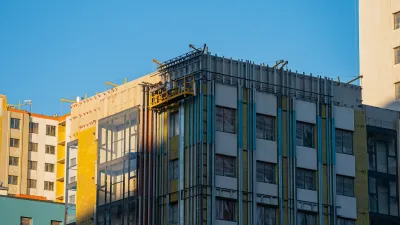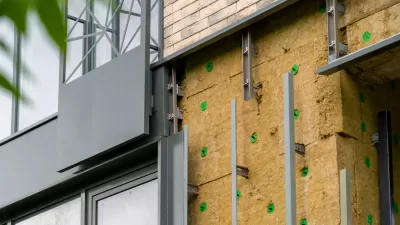Architect David Cook looks at the sustainability craze in building and architecture and warns that calling something "green" doesn't necessarily make it so.
"Increasingly misused in architecture, the term sustainability is in danger of becoming a mere label. In man's relatively short occupation of the Earth, we have succeeded in acutely threatening its future and our habitat. However, we now appear to be gaining a common understanding of the urgency of these matters. Perhaps, for whatever reason, we have finally reached a "tipping point," where we cannot remain in denial. For us sustainability is less a political issue than a humanistic issue; for qualities are just as important as quantities and a "sustainable," or indeed "green," architecture must not solely focus on environmental constraints or pre-defined performance criteria, but also celebrate the wealth and diversity of nature.
Buildings can only be spoken of in sustainable terms if they suit their purpose and are efficient to operate. Otherwise they consume unnecessary resources, are a burden to the owners and risk premature replacement. The process of design requires the consideration of the whole life cycle cost of a building, both in terms of economics and environmental impact; for buildings with a design life of 60 years, the cost of ownership and operation actually far exceeds the cost of construction. Therefore the design approach for any new construction should seek to maximize the efficiency of the building fabric in order to conserve resources in future operation. For us, sustainability in architecture is really about acknowledging the diversity of patterns of use and promoting the wide range of quite subtle, often conflicting, qualities in our built environment. In each project we seek to adopt design strategies which recognize that the building's occupants and their response to their immediate environment as an integral part of these systems."
FULL STORY: Exclusive: David Cook — No, Not the American Idol — Explains What Green Architecture Really Means

Trump Administration Could Effectively End Housing Voucher Program
Federal officials are eyeing major cuts to the Section 8 program that helps millions of low-income households pay rent.

Planetizen Federal Action Tracker
A weekly monitor of how Trump’s orders and actions are impacting planners and planning in America.

Ken Jennings Launches Transit Web Series
The Jeopardy champ wants you to ride public transit.

Rebuilding Smarter: How LA County Is Guiding Fire-Ravaged Communities Toward Resilience
Los Angeles County is leading a coordinated effort to help fire-impacted communities rebuild with resilience by providing recovery resources, promoting fire-wise design, and aligning reconstruction with broader sustainability and climate goals.

When Borders Blur: Regional Collaboration in Action
As regional challenges outgrow city boundaries, “When Borders Blur” explores how cross-jurisdictional collaboration can drive smarter, more resilient urban planning, sharing real-world lessons from thriving partnerships across North America.

Philadelphia Is Expanding its Network of Roundabouts
Roundabouts are widely shown to decrease traffic speed, reduce congestion, and improve efficiency.
Urban Design for Planners 1: Software Tools
This six-course series explores essential urban design concepts using open source software and equips planners with the tools they need to participate fully in the urban design process.
Planning for Universal Design
Learn the tools for implementing Universal Design in planning regulations.
Ada County Highway District
Clanton & Associates, Inc.
Jessamine County Fiscal Court
Institute for Housing and Urban Development Studies (IHS)
City of Grandview
Harvard GSD Executive Education
Toledo-Lucas County Plan Commissions
Salt Lake City
NYU Wagner Graduate School of Public Service





























